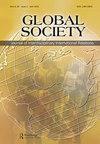韦恩斯坦丑闻的政治经济学
IF 2.3
Q2 INTERNATIONAL RELATIONS
引用次数: 0
摘要
摘要围绕好莱坞大亨、强奸犯哈维·韦恩斯坦(Harvey Weinstein)的丑闻,使基于性别的暴力(GBV)成为全球媒体关注的焦点,开启了一场关于美国及其他国家性同意、权力和性别问题的更广泛的公众对话。在这篇文章中,我们将注意力转向公开和追究系统性不法行为责任的具体过程。在被保密这么长时间后,韦恩斯坦的虐待行为是如何被公开记录的?这个雪球是怎么滚得更大的?我们认为,如果没有女权主义全球政治经济学的视角,我们就无法令人满意地解决这些问题。具体而言,我们开发了一个女权主义GPE框架,用于分析GBV是如何以丑闻的形式公开的。这引起了人们对基于性别的暴力,包括工作场所的性暴力,是如何结构性、不均衡和构成全球经济的关注;以及丑闻是如何通过(政治-经济)权力斗争来公开和定义不法行为的。然后,我们运用这个框架来分析韦恩斯坦丑闻及其影响。这篇文章的贡献有两个:一个是分析丑闻的框架,包括工作场所的GBV,另一个是女权主义GPE对韦恩斯坦丑闻的描述。本文章由计算机程序翻译,如有差异,请以英文原文为准。
The Political Economy of the Weinstein Scandal
ABSTRACT The scandal surrounding Hollywood mogul and convicted rapist Harvey Weinstein has put gender-based violence (GBV) in the global media spotlight, opening up a wider public conversation about issues of sexual consent, power, and gender in the United States and beyond. In this article, we turn attention to the specific process in which systematic wrongdoing is made public and accountable. How was Weinstein’s abuse made into a matter of public record after being kept private for so long? And how did this snowball into something bigger? We argue that we cannot satisfactorily address these questions without a feminist global political economy (GPE) lens. Specifically, we develop a feminist GPE framework for analysing how GBV is made public or not in the form of scandal. This brings attention to how GBV, including sexual violence in the workplace, is structural, uneven, and constitutive of the global economy; and how scandals are produced through (political economic) power struggles to make public and define wrongdoing. We then apply this framework to analyse the Weinstein scandal and some of its implications. The article’s contribution is twofold: a framework for analysing scandals—including GBV in the workplace—and a feminist GPE account of the Weinstein scandal.
求助全文
通过发布文献求助,成功后即可免费获取论文全文。
去求助
来源期刊

Global Society
INTERNATIONAL RELATIONS-
CiteScore
3.10
自引率
6.20%
发文量
32
期刊介绍:
Global Society covers the new agenda in global and international relations and encourages innovative approaches to the study of global and international issues from a range of disciplines. It promotes the analysis of transactions at multiple levels, and in particular, the way in which these transactions blur the distinction between the sub-national, national, transnational, international and global levels. An ever integrating global society raises a number of issues for global and international relations which do not fit comfortably within established "Paradigms" Among these are the international and global consequences of nationalism and struggles for identity, migration, racism, religious fundamentalism, terrorism and criminal activities.
 求助内容:
求助内容: 应助结果提醒方式:
应助结果提醒方式:


